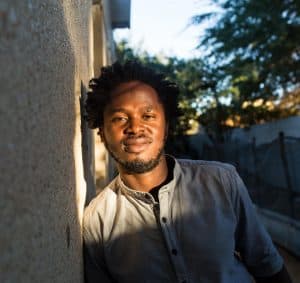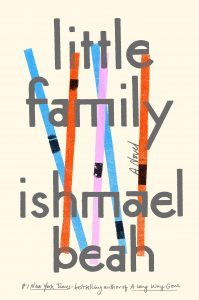The PEN Ten: An Interview with Ishmael Beah
The PEN Ten is PEN America’s weekly interview series. This week, Jared Jackson speaks with Ishmael Beah, author of Little Family (Riverhead Books, 2020).

Photo by Priscillia Kounkou Hoveyda
1. How does your writing navigate truth? What is the relationship between truth and fiction?
Every piece of writing is a form of truth in itself as it comes from a source of truth. It can be a factual truth, emotional truth, psychological truth, or the process of finding truth—either in what has happened or attempting to answer a question from a genuine place of curiosity. I believe that we all write our truth whether in fiction, nonfiction, or essays.
I come from an oral tradition storytelling background, which doesn’t believe in the singularity of truth. How we absorb the world around us and our experience of life are based on layers of who we are. Hence, when we recount or tell any story, it is filtered through that point of view—that layering—and even how we get out of our own ways to inhabit the character we write in fiction is based on our own cultural acceptance of truth and the expressions of it.
2. What does your creative process look like? How do you maintain momentum and remain inspired?
For a new project, I always begin with a question I want to answer or an idea I want to explore. Then, I think about the characters I want to employ to answer the question or explore the idea. I am faithful to my characters more than anything else. Hence, I spend more time thinking about who they are than the structure of the story itself and where it may go. The characters always take me to their stories and tell me about themselves in ways I had not imagined. After about six months or so thinking about the characters—their gender, location, age, and background—and having fully conceptualized them, I would sit down and start writing.
I usually write late at night. After 1am works really well, until daybreak, and then I will get some sleep and edit during the day. I draw inspiration from things around me, places I have lived, and the constant reminder that I must open a small window into the lives of the other.
“How we absorb the world around us and our experience of life are based on layers of who we are. Hence, when we recount or tell any story, it is filtered through that point of view—that layering—and even how we get out of our own ways to inhabit the character we write in fiction is based on our own cultural acceptance of truth and the expressions of it.”
3. How can writers affect resistance movements?
Every resistance movement comes from an idea or ideology about how people have either reimagined their lives or learned about ways to no longer succumb to the injustices they are facing. The writer’s role has always been to give people the eyes with which to enrich their humanity. This gives rise to the desire to become better human beings, to disrupt whatever stands in our way to achieve that. So, without even deliberately thinking about it, writers are always laying the foundation for the renewal of the self, of culture, of tradition, and of ways of life and living.
4. What is your favorite bookstore or library?
This one is difficult to answer, as there are so many amazingly beautiful bookstores and libraries around the world that I have visited. Perhaps I will just pick one in the United States for this, and that is the Elliot Bay Bookstore in Seattle. Besides the beautiful wooden floor and ceilings, it has a warmth and an alluring invitation that makes you want to stay browsing, sit in one of the many nooks, and read for hours.
5. How does your identity shape your writing? Is there such a thing as “the writer’s identity?”
Tremendously. If a writer’s identity doesn’t shape their writing, then I am uncertain about how they can write anything at all. Identity encompasses where you live, the places you travel to, and your realities—which all play a significant part in shaping your imagination and what you choose to write about.
“The writer’s role has always been to give people the eyes with which to enrich their humanity. This gives rise to the desire to become better human beings, to disrupt whatever stands in our way to achieve that.”
6. What advice do you have for young writers?
Become more of a reader than a writer, and you must actually live—as in, travel and experience life outside of your comfort zone. These two things will sharpen your imagination and insights about things that you witness. Otherwise, you will have a lot of blind spots to not only experience life, but even imaginatively.
7. Why do you think people need stories?
I grew up with oral tradition storytelling. The elders in my community—mostly the women, my grandmother for example—were the carriers of the stories. I was taught, and know for a fact, that stories are medicine. People need the medicine of stories poured into them to prepare them to face life. Life will always break all of us in one way or another, and stories will become our antidote to repair or survive that breakage. If you are infused with this medicine early on in life, then you build a stronger resilience to face life, to find beauty and a depth of understanding in difficult situations.
 8. Your new novel, Little Family, follows a group of five street-savvy, yet naïve young people who turn an abandoned airplane into a home. What makes a family? How do the circumstances the characters confront in this novel define their relationships with each other?
8. Your new novel, Little Family, follows a group of five street-savvy, yet naïve young people who turn an abandoned airplane into a home. What makes a family? How do the circumstances the characters confront in this novel define their relationships with each other?
What makes a family is how you bond to survive circumstances you are faced with beyond your imagination. At various stages of our lives, we build little families along the way to attain what we desire or embark on journey.
The characters in Little Family come from different backgrounds and parts of society, but they have all, in their own ways, been cast aside and must learn to find freedom at the margins of society. Their desire to be free from the bonds of society defines their relationship with each other that is the undoing of everything against their freedom. They embrace their invisibility and equally share whatever they have, however little.
“I was taught, and know for a fact, that stories are medicine. People need the medicine of stories poured into them to prepare them to face life. Life will always break all of us in one way or another, and stories will become our antidote to repair or survive that breakage.”
9. It’s been said that the best way to show a character to a reader isn’t by describing physical traits or making declarative statements about how they think or feel, but by showing them in relation to another character. Two of your characters connect the “little family” to individuals outside of their established nucleus to varying consequences. Why was it important for the world of these characters to expand? Why does the reader need to see them interact with people outside of their immediate core?
Because growth and depth in the human experience is incomplete if it only occurs in a familiar world. I wanted the reader to experience the other world of the characters, to shine a light into the nuances of how life is lived in the story. So much of the Little Family says a lot about the beautiful people, and vice versa. And one of the characters chose to live in between, in the grayscale.
10. The novel is told by an unnamed narrator, but with a focus on and through the lens of young people, adolescents. How does the point of view inform the novel? How are the events described in the novel colored through the filter of green, somewhat innocent, youth trying to make a way?
The point of view is central to the novel. It is of group of youngsters who have agency of their story, and they invite the reader into their world, their life, on their own terms. They do not want to be found as they seek their version of freedom. They are not innocent or trying to find their way, but rather, despite their age, they have learned hard lessons from life and have risen above it to become economist, psychologist, sociologist, and philosophers of their environment and human nature.
Ishmael Beah is the Sierra Leonean and American author of the novel Radiance of Tomorrow and the memoir A Long Way Gone, which was a No. 1 New York Times bestseller and has been published in more than 40 languages. A UNICEF ambassador and advocate for children affected by war, and a member of the Human Rights Watch Children’s Advisory Committee, he lives in Los Angeles with his wife and their children.






